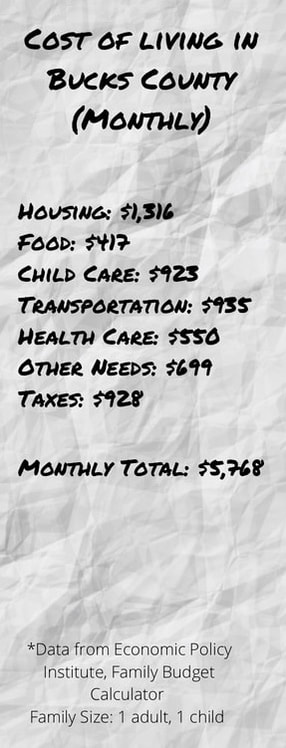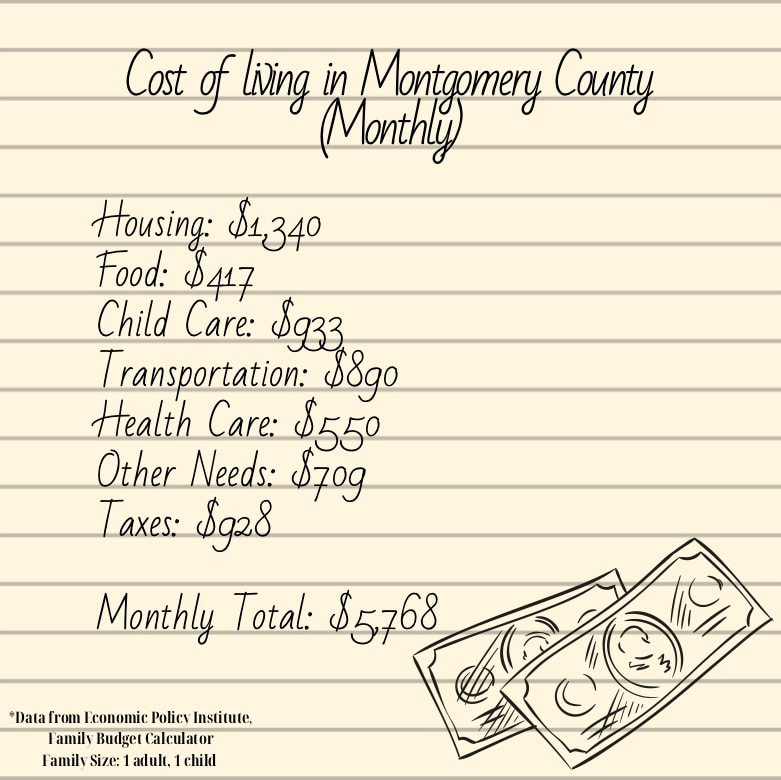|
On March 27, the federal government passed a stimulus package, allotting $1200 to every individual making less than $75,000 annually and couples making less than $150,000 annually. Parents/guardians will receive an additional $500 for every child 16 or younger. Direct deposit payments went out on April 15, with paper checks expected to follow in the weeks after.
The payments are meant to encourage activity within the economy, whether that means paying bills or making an impromptu purchase (online). But for people struggling to make ends meet, whether they’re out of work, facing reduced hours or just not getting paid enough, $1200 won’t go very far. In fact according to data from the Bureau of Labor Statistics, $1200 will cover less than two weeks’ expenses for most Americans (Check out the graphics below to find out just how much it costs to live in Bucks and Montgomery Counties monthly). And those two weeks don’t take into account the added costs that have come with stay at home orders. Even as hours, wages and job stability have gone down, living expenses are going up. Here’s how:
This doesn’t mean that the stimulus payments don’t help at all. They do. However, they aren’t a cure-all. We encourage you to look for additional ways to help your neighbors and community at this time, while remaining physically distant. And if you need help, ask. We’re here for you, too.
0 Comments
Many of us, if we’re lucky, have spent the past few (and the next few) weeks working from home. Many more are struggling to make ends meet as they face layoffs in the wake of the Coronavirus pandemic. Still others are going into work - into offices, medical facilities, grocery stores and other businesses deemed essential. These essential employees are helping to keep the rest of us afloat.
One such employee is RJLF’s very own Fellow “Joseph”. Joseph is a youth counselor at a residential facility, where he works 40 hours per week. He says that while his one-on-one work with the kids continues much as it did prior to COVID-19, there have been some noticeable changes at the facility. “All of the employees have to wear masks or they’re sent home. Your temperature is taken before you come into the building. If it’s over 100, you get sent home.” He adds that everything has to be sanitized, a lot. For the youth at the facility, life has gone virtual. Their schooling and visits with families are now online. No visitors are permitted within the building. There are no community activities. And even their interactions with each other have lessened. Rather than eating as a large group, the kids now eat lunch 10 at a time. “No one can sit [right] next to each other,” says Joseph. When asked if he’s nervous going into work still and what it feels like to be deemed an essential employee, Joseph says that his main worry is that if he gets infected, he may unknowingly infect others. But overall, he feels lucky. “You feel blessed to be working; you appreciate it,” he says. “A lot of people at my job, they’re the only people working right now in their families. “We aren’t as important as the doctors and nurses, but we are trying to take care of kids.” RJLF is so proud of Joseph and incredibly privileged to know him. Keep doing the work that you do Joseph, and thank you. |
Categories
All
Archives
July 2024
|
|
1097 Street Road
New Hope, PA 18938 |




 RSS Feed
RSS Feed
